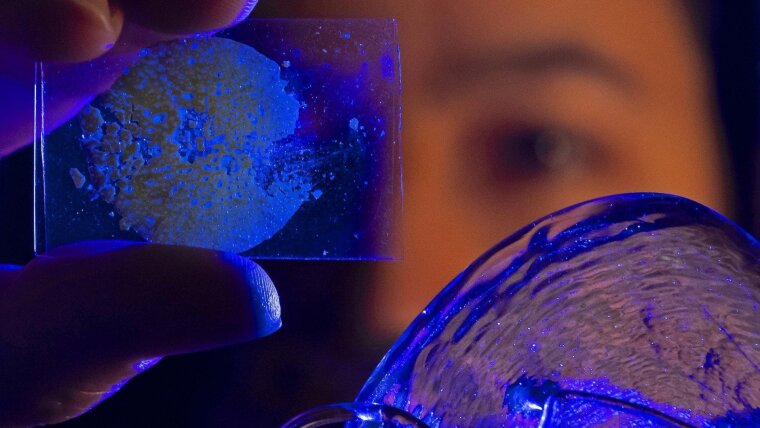
Prof. Dr Thomas Bennett from the University of Cambridge will be conducting research in Jena for three months in 2022.
Image: privatWhat is your main research focus?
The focus of my research group is on a topical class of materials, called metal-organic frameworks (MOFs). These three-dimensional porous materials consist of inorganic »nodes« linked by organic molecules and have come to great prominence in materials science over the past three decades (see box below).
Specifically, we focus in particular on the thermal and mechanical properties of MOFs in order to improve their processability and use them in hybrid glasses, for example.
What is characteristic about hybrid glasses?
Hybrid glasses differ from inorganic glasses by their highly tuneable chemistry. At present, we are working on better understanding their mechanical properties in order to be able to produce and use such materials in a targeted manner.
What is the aim of the project you are going to work on at the University of Jena and with whom are you collaborating?
This project seeks to develop new materials at the interface between inorganic glasses and MOFs. It is about understanding how the crystalline or glassy states of MOFs can be integrated into inorganic glasses. Planned future applications include glass facades in buildings in arid climates that capture water from the air at night and release water during the day, or mobile phone screens capable of detecting blood alcohol or blood sugar levels.
Our concept is to combine the processability and stability of inorganic glass with the chemical functionality of MOFs. To do this, we want to try on the one hand to impregnate inorganic glasses with crystalline MOFs and on the other hand to blend inorganic and MOF melts and thus create new classes of materials. We then need to structurally characterise these new materials and analyse their optical, thermo-mechanical and porous properties.
In Jena, I will be working intensively with Prof. Dr Lothar Wondraczek and his team, as well as with Dr Alexander Knebel, who is working with his junior research group in the field of membrane technology.
Hybrid materials from classical glasses and metal-organic framework compounds (MOFs)
Metal-organic framework compounds (MOFs) form three-dimensional molecular networks, whereby the size of the pores formed by the lattice structure can be precisely adjusted down to a few nanometres. This allows the chemical properties of this class of substances to be specifically adapted to a wide range of applications. MOFs are used, for example, as separation diaphragms, as storage for gases and liquids, as catalyst support, and for electrical energy storage.
So far, MOFs have only been used in their crystalline, ordered state. However, the fact that they can also be melted and quenched into glass has only been known for a few years. In addition to the existing inorganic glasses, organic plastic and metallic glasses, MOFs form a fourth type of glass that is interesting for a variety of applications due to its porosity and mechanical properties.
However, pure MOF glass is complex to produce and therefore expensive. That is why the research teams from Cambridge and Jena are seeking to develop new hybrid glasses that combine the properties of inorganic and MOF glasses.
Jena Excellence Fellowship Programme
This programme is part of the »LIGHT, LIFE, LIBERTY – Connecting Visions« strategy pursued by the University of Jena with the aim of promoting the university’s international visibility and its appeal to the world’s top researchers. It is open to senior fellows and postdocs who would like to research in Jena. All professors at the University of Jena can nominate potential fellows. Around four senior fellowships and four post-doctoral fellowships are awarded every year (www.uni-jena.de/en/excellence-fellowship).
